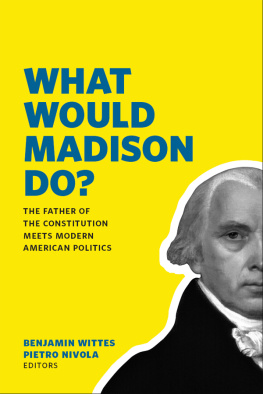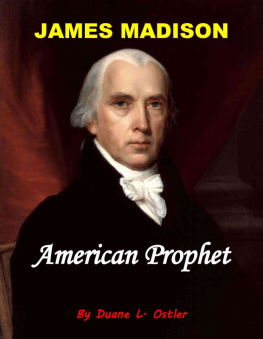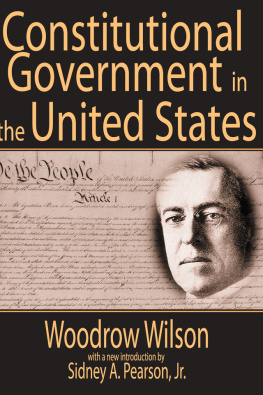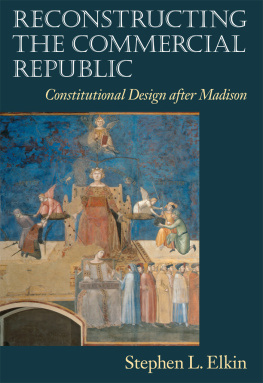Copyright 2015
THE BROOKINGS INSTITUTION
1775 Massachusetts Avenue, N.W., Washington, D.C. 20036
www.brookings.edu
All rights reserved. No part of this publication may be reproduced or transmitted in any form or by any means without permission in writing from the Brookings Institution Press.
The Brookings Institution is a private nonprofit organization devoted to research, education, and publication on important issues of domestic and foreign policy. Its principal purpose is to bring the highest quality independent research and analysis to bear on current and emerging policy problems. Interpretations or conclusions in Brookings publications should be understood to be solely those of the authors.
Library of Congress Cataloging-in-Publication data
What would Madison do? : the Constitution's architect meets modern American government / Benjamin Wittes and Pietro Nivola, editors.
pages cm
Includes bibliographical references and index.
ISBN 978-0-8157-2657-9 (hardcover : alk. paper)
ISBN 978-0-8157-2674-6 (pbk. : alk. paper)
ISBN 978-0-8157-2658-6 (epub)
ISBN 978-0-8157-2743-9 (pdf)
1. Madison, James 17511836Political and social views. 2. United StatesPolitics and governmentPhilosophy. I. Wittes, Benjamin, editor.
II. Nivola, Pietro S., editor.
E342.W48 2015
973.5'1092dc23 2015019158
9 8 7 6 5 4 3 2 1
Typeset in Adobe Caslon
Composition by Elliott Beard
In memory of Martha A. Derthick (19332015) teacher, colleague, friend
ACKNOWLEDGMENTS
A number of people whose names do not appear as authors or editors in this volume played essential roles in making it happen. Thanks, first off, to the employees and staff of James Madison's Montpelier and its Robert H. Smith Center for the Constitution, with whom Brookings partnered for a multi-year collaboration that ultimately resulted in this book. Kat Imhoff, Montpelier's president, and C. Douglas Smith were unstinting in their support of the project. Two other people at Montpelier deserve special mention: Sean O'Brien and Jennifer Patja Howell, who have shepherded the relationship with Brookings for the entirety of its history. They have been great partners, essential collaborators, and good friends. We are especially indebted to Eileen Hughes, our skilled editor at the Brookings Press, who worked patiently over several months on the papers contributed by the book's multiple authors. We also are grateful to Janet Walker, the managing editor at the press, for her assistance in overseeing the editing and publication process and to Cody Poplin, who helped edit early drafts of the volume's contents.
One
INTRODUCTION
Perspectives on Madison's Legacy for Contemporary American Politics
BENJAMIN WITTES AND PIETRO S. NIVOLA
In 1785, while serving as a member of the Virginia legislature, James Madison wrote a letter to a friend who was contemplating the possible parameters of a constitution for Kentucky, which was soon to become independent of Virginia. His friend, Caleb Wallace, had asked him a number of questions, including one on a lot of people's minds today: Should there be a periodical review of the Constitution?
Madison responded noncommittally. He noted that the idea was good in theory but had not been tried much, and he mentioned a couple of schemes by which review of a constitution could be built into its fabric. He concluded that perhaps a temporary constitution made sense for Kentucky. In your situation, he wrote, I should think it both imprudent & indecent not to leave a door open for at least one revision of your first Establishment, imprudent because you have neither the same resources for supporting nor the same lights for framing a good establishment now as you will have 15 or 20 Years hence, indecent because a handful of early settlers ought not to
By the end of his long life, Madison was firmly committed to the young nation's constitutional arrangement, especially its stronger union, which he had done more than anyone else to design. His 1834 Advice to My Country, one of the last things he ever wrote, is brief: The advice nearest to my heart and deepest in my convictions is that the Union of the States be cherished and perpetuated. Let the open enemy to it be regarded as a Pandora with her box opened; and the disguised one, as the Serpent creeping with his deadly wiles into Paradise.
There is no shortage of academic tracts pondering whether the American constitutional order, so influenced by Madison's thinking, has grown outmoded in important respects. Periodically, the discontents express concern that the old Madisonian framework may not be up to the challenge of addressing modern society's most pressing problems. Isn't the framework, at least in part, an anachronism that perpetuates governmental inefficiencies and inequities, the critics ask? Their qualms are somewhat reminiscent of Madison's own in 1785. What right, they ask, does the handful of early settlers who established the U.S. Constitution now have to preclude a populous Country of 300 million people from modernizing it?
Defenders of the American political system today rejoin that while much of it continues to reflect the exigencies of its original framers, the Constitution also has proven resilient and innovative, and they warn that those who call for fundamental reform should be careful what they wish for. This view is closer to Madison's advice to his country in 1834to his insistence that the Constitution was not to be trifled with and to his warnings about renegotiating a hard-won compact.
This book joins the debate: How wellor at least how consequentiallydoes the Madisonian system perform? But the book also asks an additional question: If Madison could peer at the present, how would he regard the current condition of the key political institutions that he helped originate and the government policies that they make? The book, in short, explores what Madison might think of contemporary U.S. politics and how reverential we should remain toward the system that he bequeathed to the nation.
To contemplate these matters, a group of scholars convened at Montpelier, James Madison's home, in Orange, Virginia, during the fall of 2013, under the joint auspices of Montpelier's Robert H. Smith Center for the Constitution and the Brookings Institution. This volume contains the papers presented at that conclave. The book, in accordance with the questions posed, has two parts. The first comprises five chapters concerned primarily with systemic performance: Does the intricate edifice that Madison and his colleagues engineered still measure up? The second comprises five chapters that illustrate the extent to which the Father of the Constitution, were he with us today, might be discomfited by contemporary developments in American politics and public policy.
In , John DiIulio Jr., of the University of Pennsylvania, examines a contemporary political shortcoming that Madison and the Founders arguably had a hand in bequeathing: the failure of policymakers these days to address fully the nation's long-range financial liabilities. American citizens yet to be born, DiIulio writes, are being stuck with an entitlement benefits bill that is about five times the country's current annual GDP. He suggests more than one reason that America has not broken the habit of legally robbing future citizens in order to enjoy present benefits without having to pay for them itself. Not least among his explanations is the power of organized groups with a vested interest in feeding and fattening the public sector. Another, however, is simply public opinion: substantial majorities oppose genuine retrenchment of the welfare state and will not hesitate to punish elected officials who attempt more than token tweaks to either entitlements or the tax revenues necessary to support them.







